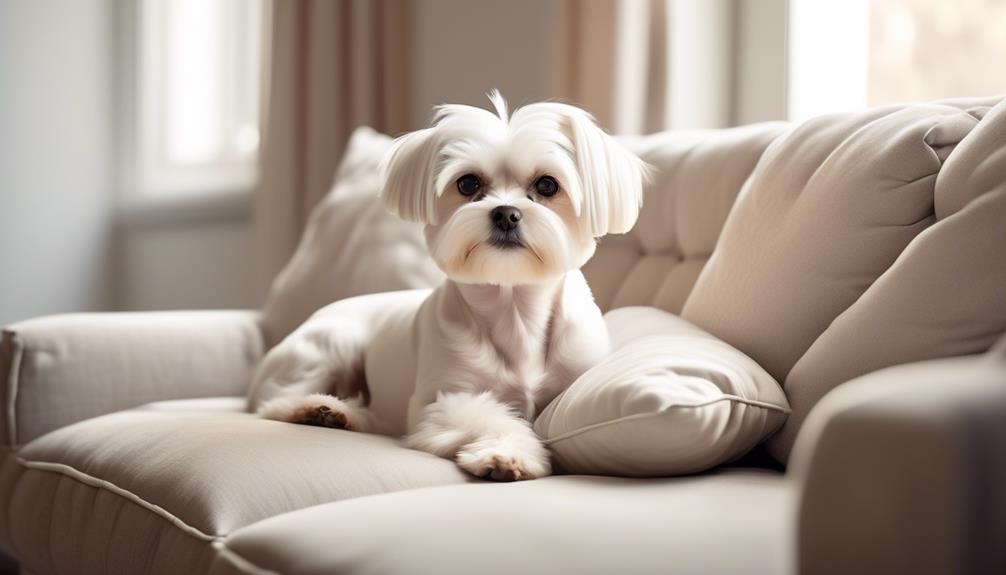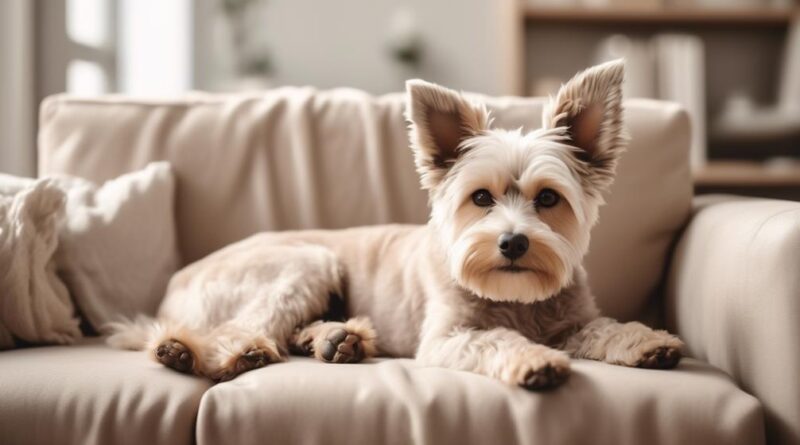What Are the Quietest Dog Breeds for Apartments?
Tired of your neighbors complaining about the constant barking from your furry friend? You're not alone. Finding a quiet and well-behaved companion for your apartment can be a challenge, but fear not – there are breeds that are known for their peaceful nature.
Whether you're a seasoned dog owner or considering adopting your first pet, the quest for the perfect apartment pooch is a crucial one. Stick around to discover the top contenders for the title of 'quietest dog breed,' and find the ideal match for your living situation.
Basenji
If you're looking for a quiet and apartment-friendly dog, the Basenji might be the perfect choice for you. Known for their independent and intelligent nature, Basenjis have a unique temperament. They're often compared to cats due to their grooming habits and strong-willed personality. This breed is also famous for being relatively quiet, making them ideal for apartment living.
When it comes to exercise, Basenjis are active and energetic dogs. They've a high exercise need and enjoy activities such as running, hiking, and playing games. Due to their hunting background, they've a strong prey drive and should always be kept on a leash or in a securely fenced area when outdoors.
Mental stimulation is also important for Basenjis, as they're clever and can easily become bored. Engaging them with interactive toys and puzzle games can help satisfy their need for mental challenges.
Cavalier King Charles Spaniel
The Cavalier King Charles Spaniel is a small, affectionate breed known for its gentle temperament and elegant appearance. When it comes to training methods for Cavalier King Charles Spaniels, positive reinforcement works best. They respond well to praise, treats, and a calm, patient approach.
Here are some specific training tips:
- Socialization: Introduce your Cavalier King Charles Spaniel to various people, pets, and environments from a young age to help them become well-adjusted and confident adult dogs.
- Health considerations for Cavalier King Charles Spaniels are essential for maintaining their well-being. Due to their brachycephalic (short-nosed) faces, they can be prone to respiratory issues, so it's important to avoid situations that could lead to overheating. Additionally, regular veterinary check-ups, a balanced diet, and proper dental care are crucial for their overall health and longevity.
Cavalier King Charles Spaniels are known to be prone to certain genetic health issues, such as heart conditions and syringomyelia, a neurological disorder. Therefore, it's advisable to source your pup from a reputable breeder who screens for these conditions. Regular exercise and a nutritious diet play a vital role in keeping this breed healthy.
With their sweet and gentle nature, the Cavalier King Charles Spaniel is a wonderful companion for apartment living, as long as their training and health needs are consistently met.
Shih Tzu
Considered a delightful companion, the Shih Tzu is a small breed known for its affectionate nature and luxurious coat. When it comes to grooming your Shih Tzu, regular brushing and grooming are essential to maintain their beautiful coat. Their long, flowing hair requires daily brushing to prevent tangles and mats. Additionally, frequent bathing and trimming around the eyes and ears are necessary to keep them clean and comfortable. Professional grooming every 4-6 weeks can also help keep their coat in top condition.
In terms of exercise, Shih Tzus aren't particularly high-energy dogs, so they can meet their exercise requirements with daily walks and indoor playtime. Due to their brachycephalic (short-nosed) features, they may be sensitive to extreme temperatures, so it's important to monitor them during outdoor activities. Interactive toys and short training sessions can also provide mental stimulation and physical activity for your Shih Tzu indoors. Remember that every dog is unique, so it's essential to tailor their exercise routine to their individual needs and preferences.
Bichon Frise
With their cheerful disposition and hypoallergenic coat, Bichon Frises make wonderful companions for apartment living. These small, affectionate dogs are known for their friendly nature and adaptability to various living environments, making them an excellent choice for apartment dwellers.
- Grooming Tips for Bichon Frise
- Bichon Frises have a double coat that requires regular grooming to prevent matting and tangles. Brush their coat at least three times a week to keep it free from knots and to minimize shedding. Regular bathing every 4-6 weeks will help maintain their signature fluffy white coat. Additionally, professional grooming every 4-6 weeks is recommended to keep their coat in top condition.
- Pay special attention to their eyes and ears. Clean their eyes with a damp cloth to remove any discharge, and gently clean their ears to prevent wax buildup and potential infections.
- Training Techniques for Bichon Frise
- Bichon Frises are intelligent and eager to please, making them relatively easy to train. Use positive reinforcement techniques such as treats, praise, and play to motivate and encourage good behavior.
- Start training early to socialize them with other dogs and people. This will help curb any potential separation anxiety and ensure they're well-mannered in various situations.
French Bulldog
If you're considering a French Bulldog as a companion for apartment living, their affectionate nature and low exercise needs make them a suitable choice for urban dwellers. French bulldogs have a gentle and affectionate temperament, making them great companions for apartment living. They're known for their loyalty and love being around their owners, making them excellent indoor pets. Their adaptable nature allows them to thrive in smaller living spaces, which is ideal for apartment dwellers.
When it comes to exercise needs, French Bulldogs are relatively low-energy dogs. A short daily walk or some indoor playtime is usually enough to keep them happy and healthy. Due to their brachycephalic (short-nosed) features, they're sensitive to extreme temperatures, so moderate exercise is key to preventing overheating or exhaustion. Their exercise requirements make them well-suited for apartment living, as they don't demand extensive outdoor activities or a large yard to run around in.
Greyhound
Looking for a quiet and low-energy dog breed for apartment living? The Greyhound's calm demeanor and minimal exercise needs make it an excellent choice for urban dwellers. When it comes to Greyhound behavior in small spaces, you'll find that these elegant canines are surprisingly well-suited for apartment living. Here's why:
- Greyhound behavior in small spaces:
- Low energy levels: Greyhounds are known for their laid-back nature, making them well-adapted to living in smaller environments like apartments. They're content to lounge around and aren't typically prone to excessive barking or restlessness indoors.
- Space-saving lounging: Despite their large size, Greyhounds are notorious couch potatoes. They're content with a cozy spot by the window or a soft bed, so they won't demand a lot of space within the apartment.
When it comes to training techniques for apartment living with a Greyhound, consistency and positive reinforcement are key:
- Training techniques for apartment living with a Greyhound:
- Leash manners: Teaching your Greyhound proper leash manners is crucial for apartment living. With their gentle and sensitive nature, Greyhounds respond well to positive reinforcement training methods.
- Mental stimulation: Keeping your Greyhound mentally stimulated through interactive toys and puzzle games can help prevent boredom and any potential destructive behaviors, ensuring a harmonious coexistence in your apartment.
Maltese

Consider the Maltese, a small and affectionate breed that's well-suited for apartment living due to its gentle nature and minimal exercise requirements. If you're considering bringing home a Maltese puppy, it's important to start training early. Maltese puppies are intelligent and can be trained effectively with positive reinforcement techniques such as treats and praise. Consistent training will help curb any potential barking tendencies, making them even more suitable for apartment living. Socialization is also key to ensure your Maltese puppy grows up to be well-adjusted and comfortable in various situations. Exposing them to different people, pets, and environments from a young age can help prevent shyness or fearfulness.
Grooming requirements for Maltese dogs are another aspect to consider. Their long, silky white hair requires regular grooming to prevent mats and tangles. Daily brushing and monthly baths are essential to keep their coat in good condition. Many Maltese owners opt for professional grooming every 4-6 weeks to maintain their dog's signature look and keep their coat healthy. Additionally, regular dental care is crucial for Maltese dogs, as they're prone to dental issues. Introducing a dental care routine early on can help prevent tooth decay and gum disease.
Whippet
The Whippet, a sleek and athletic breed known for its gentle temperament and low exercise needs, is an excellent choice for apartment living. If you're considering this breed, here's what you need to know:
- Exercise Needs
- Whippets are moderate energy dogs, requiring daily exercise but not excessive activity. A couple of short walks and some playtime in a fenced area should suffice. They love to sprint, so the occasional off-leash run in a safe environment is ideal.
- Mental stimulation is also important for Whippets. Engage them in interactive games and training sessions to keep their minds sharp and prevent boredom, which can lead to unwanted behaviors.
- Grooming Requirements
- One of the perks of having a Whippet in an apartment is their low grooming needs. Their short, smooth coat is easy to maintain and only requires a weekly brushing with a soft brush to remove loose hair and keep the coat shiny.
- Bathing is rarely necessary unless they get into something messy. However, their nails should be trimmed regularly, and their teeth should be brushed to maintain overall health.
With their calm and well-mannered disposition, minimal grooming requirements, and manageable exercise needs, Whippets make wonderful companions for apartment dwellers. If you're seeking a quiet, low-maintenance dog that thrives in a smaller living space, the Whippet could be the perfect choice for you.
Frequently Asked Questions
Do Any of These Dog Breeds Have a Tendency to Bark Excessively?
If any of these dog breeds tend to bark excessively, training techniques and behavioral modification can help. Noise sensitivity and environmental triggers can also influence barking behavior. Consistent training and a calm environment can mitigate excessive barking.
Are Any of These Breeds Prone to Separation Anxiety When Left Alone in an Apartment?
When choosing a dog breed for an apartment, consider separation anxiety. Address it with proper training methods and socialization. Look for breeds with manageable exercise needs to help alleviate potential anxiety and promote calm behavior when left alone.
Which of These Breeds Are Considered Low-Energy and Less Likely to Become Restless in an Apartment Setting?
For low energy breeds that are suitable for apartments, consider those with minimal noise levels and less barking. Breeds like Cavalier King Charles Spaniel, Shih Tzu, and Greyhound are known for their calm demeanor.
Are There Any Specific Grooming or Maintenance Needs for These Breeds That Apartment Dwellers Should Be Aware Of?
When considering dog breeds for apartment living, it's important to be aware of specific grooming needs. Coat care and shedding can vary, so research breeds that match your maintenance preferences. Additionally, consider exercise needs and mental stimulation for a happy pup.
Do Any of These Breeds Have a History of Being Difficult to Housetrain in an Apartment Environment?
Crate training is crucial for apartment housetraining, especially for dog breeds with a history of potty accidents. Behavioral training and socialization opportunities are also important for these breeds to adapt well to apartment living.
Conclusion
So if you're looking for a quiet companion in your apartment, consider one of these breeds.
With their calm demeanor and minimal barking, they're great options for apartment living.
Remember to consider the specific needs and personalities of each breed before making a decision.
With the right training and care, any of these quiet dog breeds can make a wonderful addition to your apartment lifestyle.
